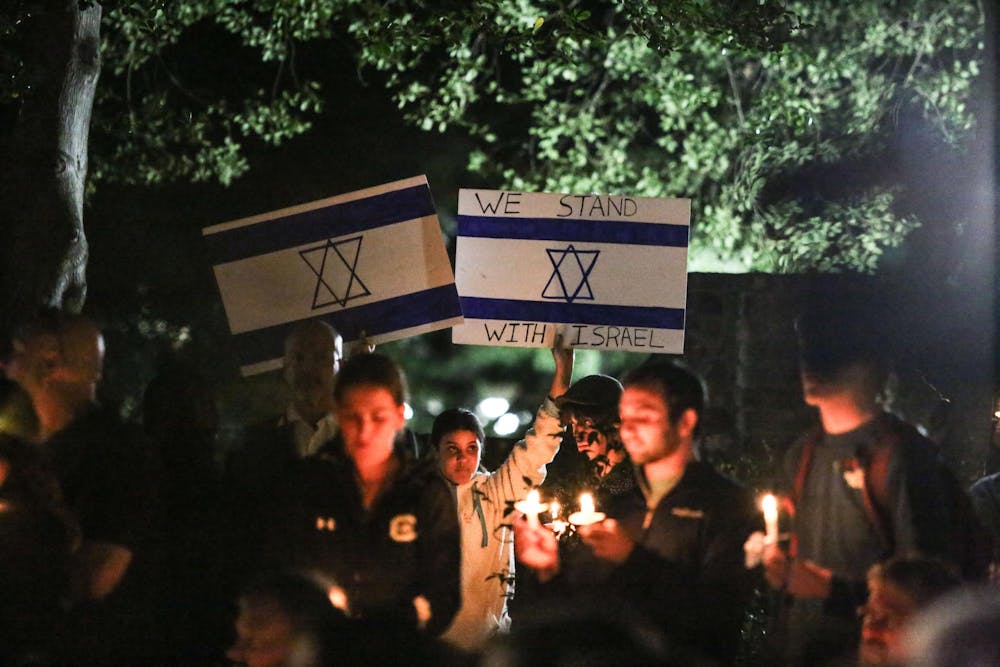USC faculty, staff and students said they have felt a lack of support from the university amid the ongoing fighting in the Gaza strip.
Hamas, a terrorist group that is part of the Islamic Resistance movement, launched surprise attacks from the Gaza Strip into nearby Israel towns one day after the 50th anniversary of the start of the 1973 Yom Kippur War. Those attacks killed approximately 1,400 Israeli citizens, according to The Washington Post.
Israel then responded by firing a series of counter airstrikes that have killed more than 2,700 Palestinians in the Gaza strip so far.

Protest signage held by participators of the Free Palestine Emergency Demonstration. The signs contain phrases such as "Resistance against occupation is a human right," and "End the genocide." The rally was held by the North and South Carolina Party for Social Liberation at the South Carolina Statehouse on Oct. 17, 2023.
USC board of trustees Chair Thad Westbrook and university President Michael Amiridis said in Friday's board of trustees meeting that they were concerned about the ongoing attacks between Israel and Hamas.
“We must condemn Hamas and the terrorist acts that destroyed innocent families. We must condemn the savage and unthinkable atrocities committed against women, children and babies in Israel,” Westbrook said.
Amiridis said the unviersity is focused on supporting the USC students and families who have been impacted by the conflict.
"USC shares the world's heartbreak over the recent and ongoing events in the Middle East," Amiridis said in the statement. "These events are deeply affecting the lives of people around the world, including members of our USC community."
University workers said they appreciated the statement but were unhappy with how long it took to release one. Amiridis and Westbrook made their statements on Oct. 13 — six days after the conflict began.
“They embarrassed themselves by taking too long,” said Stanley Dubinksy, a professor of linguistics and founding program director of Jewish Studies at USC.
Dubinsky said students, faculty and staff, who are directly affected by this conflict, need the administration to think about its response as humans rather than as leaders of the university.
“There comes a certain point at which your students need you, and they need you to respond to them, not as a Dean, not as a Provost, not as a president, but as a person," Dubinsky said. "Take off your administrative hat, put on your human hat and start thinking about what your response should be 'cause these are just people."

The university directly contacted students who were affected by the ongoing Israeli-Hamas conflict, Provost Donna Arnett said in an email to faculty and staff on Oct. 12.
Rabbi Meir Muller, an associate professor of early childhood education and principal of the Cutler Jewish Day School, said students he had reached out to had not received any communication from USC. Palestinian student Nezar Elwan said he has not received any direct communication from the university.
“It makes me feel good when I know someone's with me, but I also feel like a corporation doesn't actually care,” said Elwan, a first-year psychology student.
Students and university employees said there is a need for the general university community to educate themselves on the ongoing conflict in the Middle East.
"My role here is through education and through information and through my voice and through my words, to help them there and to promote understanding (of) what's going on,” Dubinsky said.
Elwan said students need to continue to learn about both sides of the conflict before passing judgement on the conflict.
“When you're educated first, then you can make the correct decision, who to support and who not to support,” Elwan said. "(Students are) really just supporting one side (Israelis), but a lot of the other side (Palestinians) isn’t being supported. So I feel that that's one of the things students need to educate themselves on, so they know what to say and know what to think."
University faculty and staff said that students who are affected by this ongoing attacks in Israel and Palestine can always reach out for emotional and mental health support.
“Students, know that your Jewish faculty and counsel are here for you," Muller said. "We want to make sure that you feel secure. We want to help you."

